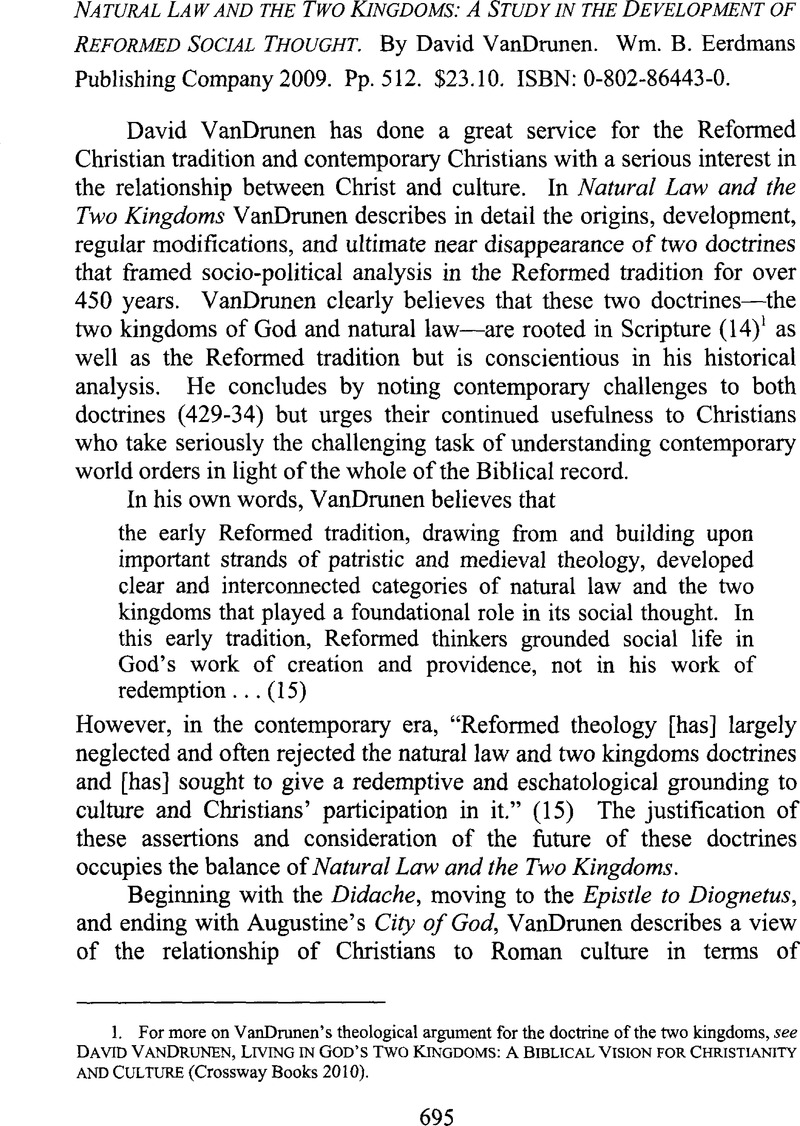Article contents
Natural Law and the Two Kingdoms: A Study in the Development of Reformed Social Thought. By David VanDrunen. Wm. B. Eerdmans Publishing Company2009. Pp. 512. $23.10. ISBN: 0-802-86443-0.
Published online by Cambridge University Press: 24 April 2015
Abstract

- Type
- Book Reviews
- Information
- Copyright
- Copyright © Center for the Study of Law and Religion at Emory University 2010
References
1. For more on VanDrunen's theological argument for the doctrine of the two kingdoms, see Vandrunen, David, Living in God's two Kingdoms: A Biblical Vision for Christianity and Culture (Crossway Books 2010)Google Scholar.
2. VanDrunen manages to cover with reasonable clarity contemporaries of Calvin like Martin Bucer, Peter Martyr Vermigli, Wolfgang Musculus, Jerome Zanchi; the Marian Exiles (John Knox, John Ponet, and Christopher Goodman); the Huguenot resistance writers (Theodore Beza, François Hotman, and the author of Vindiciae contra Tyrcmnos); later English writers George Buchanan and Samuel Rutherford; Continental theologians Johannes Althusius and Francis Turretin; early American writers John Cotton and Stuart Robinson; nineteenth century Americans Charles Hodge and James Thornwell; Abraham Kuyper; Karl Barth; neo-Kuyperians Herman Dooyeweerd, Henry Stob, Cornelius Plantinga, Al Wolters, Craig Bartholomew, and Michael Goheen; Cornelius Van Til and two of his epigones, Greg Bahnsen and Meredith G. Kline.
3. See generally VanDrunen chs. 5 & 6 (bookending Samuel Rutherford and Francis Turretin with Stuart Robinson and James Thornwell). One might question VanDrunen's omission of other Reformed theologians like Gisbertus Voetius, Johannes Cocceius, Wilhelmus a Brakel and Hugo Grotius from the Continent, William Ames of England and the Mathers (Cotton and Increase) from America. At 512 pages, however, Natural Law and the two Kingdoms is already at the limit for popular academic works.
4. (“[T]he Hodge-Thornwell disputes revealed some lingering ambiguity about how the distinction between spiritual and civil affairs was to be understood and how church and state respectively ought to take jurisdiction over them.”). See also id. at 431-32 (“[I]t has often not been clear exactly what it means for a thing to be ‘spiritual.’”).
5. Listing the dual mediatorship of Christ, grounding common grace in the Noachic covenant, implications of the death and resurrection of Christ for the authority of the state, the holistic character of the Christian life, and the meaning of “spiritual” in connection with the jurisdiction of the redemptive kingdom.
6. The corrosive effects of Freudian psychology on the reliability of the human conscience are of a piece with the modern turns of Kantian epistemology and Darwinian naturalism.
7. This account of the distinctive of theonomy does not accord with VanDrunen's who sees in theonomy an outworking of certain strands of the thought of Cornelius Van Til. VanDrunen at 411 (“Bahnsen's defense of theonomy picked up on some common Van Tilian themes such as the need to resist, in all areas of life, human attempts to be autonomous in thought and action.”).
8. Budziszewski, J., The Line Through the Heart: Natural law as Fact, Theory, and Sign of Contradiction 40 (Intercollegiate Stud. Inst. 2009)Google Scholar.
- 1
- Cited by




